Enhanced tracking protection
Enhanced tracking protection in Proton Mail blocks spy pixels (email trackers) to protect your privacy from email senders, giving you greater peace of mind. This feature is enabled by default on the Proton Mail web, iPhone, and iPad apps.
On our web app, Proton Mail gives you added protection by removing known tracking links from links in your emails.
What are email trackers?
Spy pixels
Tracking links
How Proton Mail protects you
Enhanced tracking protection on the Proton Mail web app
Enhanced tracking protection on Proton Mail for iPhone and iPad
Enhanced tracking protection FAQs
What are email trackers?
Companies often include email trackers in newsletters and other marketing material they send you. There are two common types of email trackers: spy pixels and tracking links.
Spy pixels
A spy pixel, also known as a tracking pixel, is a powerful marketing tool that involves inserting an image into an email in the form of a remote image URL. When you open a message containing a spy pixel, the linked image is loaded from the source server, and sensitive information can be sent back to the sender. This can include:
- Whether the email containing the tracker has been opened
- Date and time of opening
- Device type and operating system
- In some cases, even your IP address and geographic location
This information can then be collected and used to profile you and target you with personalized ads.
Many of these spy pixels are almost invisible — tiny transparent images that are solely used to collect additional information about you.

Tracking links
Companies also try to track you with tracking links – URLs containing tracking parameters to monitor the success of marketing campaigns. The most common tracking parameters are UTM (Urchin Tracking Module) parameters, which are supported natively by Google Analytics.
When you click on a link with UTM tracking parameters, the sender may track your interaction with their website over time and between apps.
How Proton Mail protects you
Proton Mail’s enhanced tracking protection protects your privacy in two ways:
- Spy pixel protection: We remove known email trackers whenever you receive an email. We also pre-load other remote images on your behalf using a proxy with a generic IP address and geolocation. This hides your personal information and the exact time you opened the email. Images are cached for a few days for faster, secure access.
- Tracking links protection (web app only): On the Proton Mail web app, we also “clean” the links in your emails, removing any known UTM or other tracking parameters from the URLs. So you can click these links without the sender monitoring your behavior. Here’s an example of a tracking link before and after cleaning.
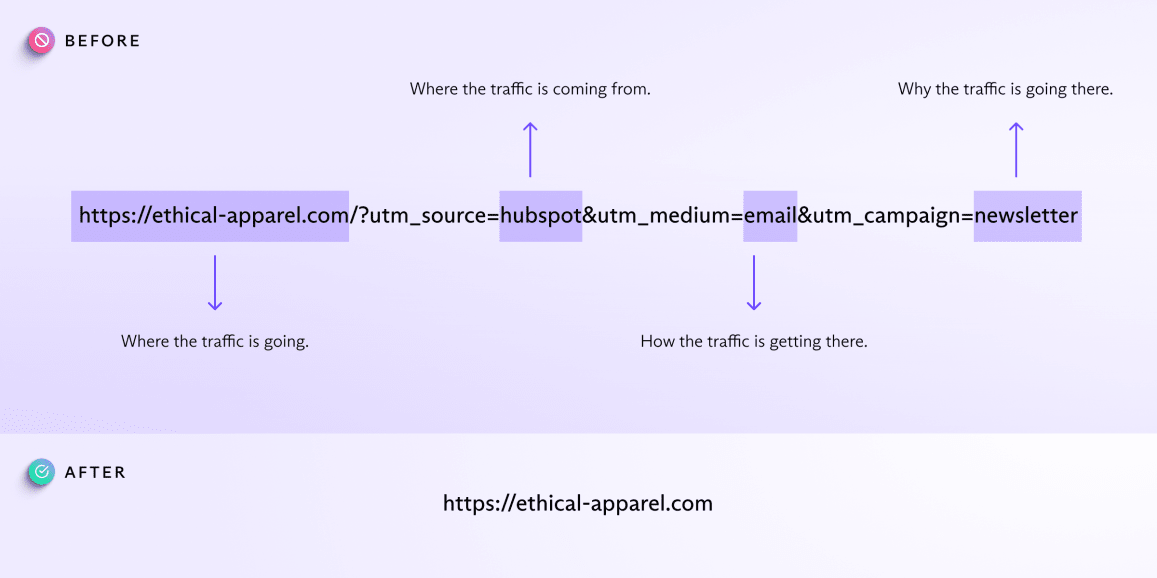
Enhanced tracking protection on the Proton Mail web app
If you receive an email containing spy pixels (trackers) or tracking links, you’ll see the shield icon at the top right of the email.
The number on the icon (9 in the example below) indicates the total number of email trackers blocked and links “cleaned”.
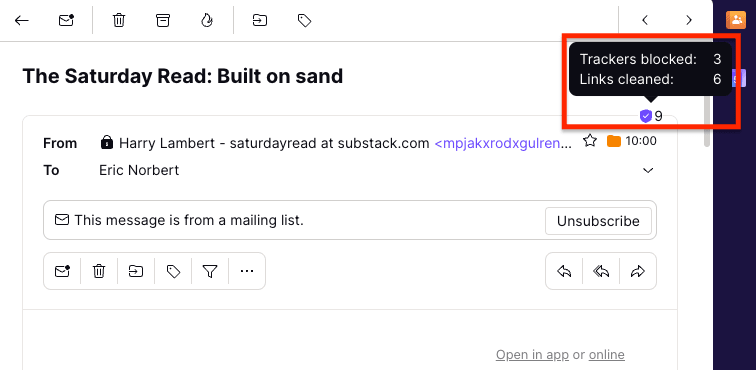
Click the shield icon to learn more about the blocked trackers and cleaned links.

Click on the number of trackers blocked or links cleaned to get more details about which domains or links are targeting you.

Enhanced tracking protection is enabled by default.
To turn off enhanced tracking protection:
- Go to Settings → All settings → Proton Mail → Email privacy.
- Turn off the Block email tracking switch.
Note that this setting is synced across all your Proton Mail apps.
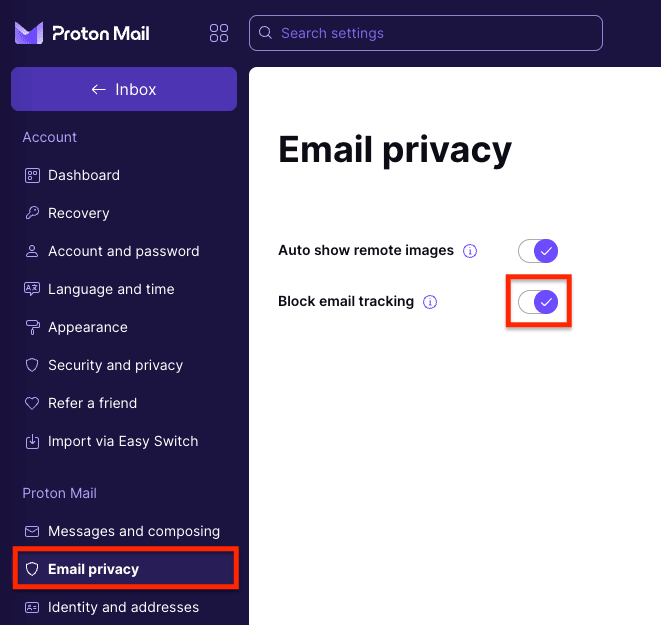
Enhanced tracking protection on Proton Mail for iPhone and iPad
If you receive an email containing spy pixels on your iPhone or iPad, the shield icon at the top right of the email will fill with purple. Tap on the shield icon to find out more about the blocked trackers.
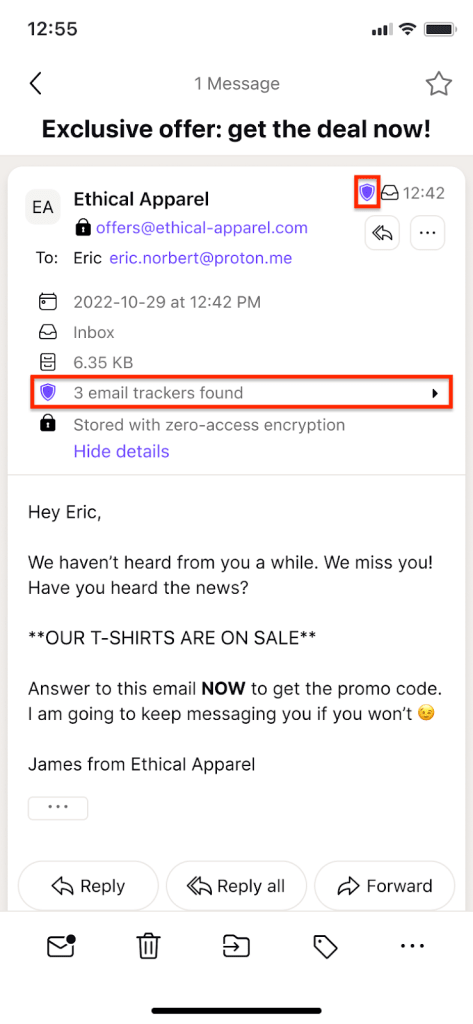
Tap the number of email trackers found and select a URL to get more details about a tracker.

Enhanced tracking protection is enabled by default.
To turn off enhanced tracking protection:
- Tap Settings → Account settings → Privacy.
- Turn the Block email tracking switch off.
Note that this setting is synced across all your Proton Mail apps.
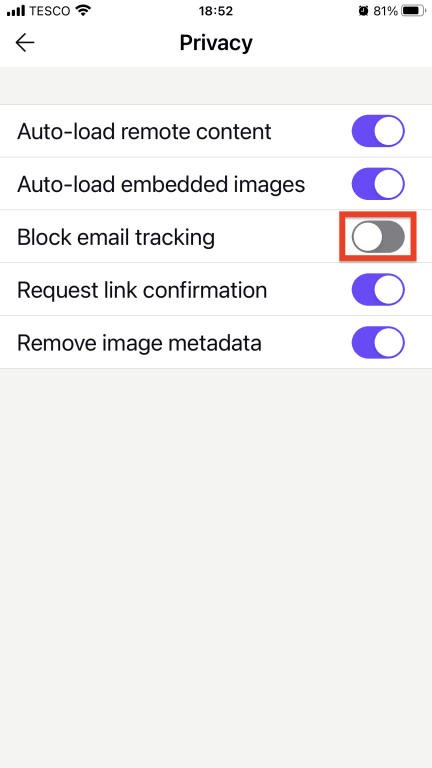
Enhanced tracking protection FAQs
If Proton can intercept remote images inside my email, can Proton read my emails?
To protect you, we now load remote images in your emails using our servers as we receive them rather than when you open them.
This applies to emails you receive that are not end-to-end encrypted, such as most newsletters and promotional emails. These emails have already been checked for spam, phishing, and malware before arriving in your inbox, so we simply added tracking protection to existing automated filters.
Emails are then stored in your inbox with zero-access encryption, and we can no longer access them.
Learn about end-to-end-encryption when using Proton Mail
Should I still prevent remote content from loading automatically?
It’s safe to automatically load remote content when email tracking is blocked. This allows you to enjoy the extra context provided by images while staying safe from trackers.
Note: This is now the default setting. But if you’ve disabled it, you can re-enable it again by following the steps in the article linked below. This switch is not synced across our apps, so you can choose the preferred setting on each of your devices.
Learn more about loading images in Proton Mail
How can you protect me from tracking links in my emails if they’re encrypted?
We remove tracking parameters from links client-side, meaning email contents such as links are only decrypted and cleaned once you’re logged in.
How do you know which tracking links to block?
We maintain our own link detection list and also use open-source block lists that are continuously updated.
I can see links in an email have tracking parameters, so why does it say “No links cleaned” when I click on the shield icon?
Proton Mail blocks known tracking parameters that we’re aware of. However, many companies use their own tracking parameters, which can make it hard for us to detect them.
In addition, removing tracking parameters from a link sometimes means it no longer works. If you believe we missed some tracking parameters, you can submit a bug report to let our team know.
